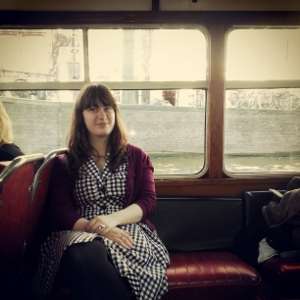Thankfully, when it comes to classical music, programmes around the theme of death tend to make highly energetic evenings. The eighth Prom of this year was no exception, as Thomas Adès led the BBC Symphony Orchestra in the world première of his new work Totentanz, but not after performances of two similarly themed works: Britten’s Sinfonia da Requiem and Lutoslawski’s Cello Concerto.
Britten’s Sinfonia da Requiem, his largest purely orchestral piece, was given a reading by Adès that emphasized its more lyrical parts, and was at times a bit calmer than other interpreters have it. This made the piece highly effective in some ways, as the understated opening “Lacrymosa” made its climax all the more powerful. In contrast, the second movement was even more manic than usual, with a first taste of the exceptional brass and woodwinds in the BBC Symphony Orchestra.
Lutosławski’s Cello Concerto does not tell us of death the way the Britten and Adès pieces do. This is partly because it has some witty moments, but despite this it is above all a concerto about prosecution. The lone cello combats the orchestra, and ultimately comes out victorious, but not after almost being suffocated many a time. It is always an extremely impressive work to hear. It requires not only virtuosity from the soloist, but an extreme emotional involvement as well. Soloist Paul Watkins’ projection was at times slightly on the soft side, but his playing was moving and convincing throughout.
To be able to witness the world première of a new Adès piece is quite rare, and with Totentanz, spanning just over half an hour, the composer treated us to his longest concert-hall work yet. Totentanz is dedicated to the memory of Witold Lutosławski, and for the foundation of the piece, Adès used a beautiful text originally written on a painted cloth (now sadly destroyed) at the St Mary church in Lübeck. The main character is Death, sung by a baritone, who invites his various victims to dance with him. The victims, all sung by mezzo-soprano, do not want to join Death, yet their appeals go unnoticed.
The BBC Symphony Orchestra and Adès were joined by baritone Simon Keenlyside, whose previous experience with Adès includes playing Prospero in his opera The Tempest (put on at the Met last year), and Dutch mezzo-soprano Christianne Stotijn. Their voices blended beautifully, Keenlyside portraying the controlled and rather disinterested Death, with Stotijn’s characters growing progressively more hysterical, portraying the victims of death; a pope, emperor, cardinal, king, monk, knight, mayor, doctor, usurer, merchant, parish clerk, handworker, peasant, maiden, and finally a small child.
The music was typical Adès in some ways, with the strings remaining in the higher register for a large part of the work, exciting rhythms throughout, and some incredible percussion moments. I would say that it is one of the best pieces he has written, with incredible depth, clarity, and some musical moments I will never forget. Adès had already proved to be a great writer for voice, not least in his two operas, and Totentanz only adds more proof of this. At times the singers could not combat the sound coming from the orchestra, but overall they more than held their own. One of the most memorable parts of the music was when from the character of the mayor onwards, Keenlyside and Stotijn sung “together” – singing different melodies and text, yet at the same time – guided by the orchestra, who eventually took over and offered a loud, stunning musical climax.
The ending of Totentanz was surprising for Death’s words to the child: “Nimm zarter Säugling an den frühen Sensenschalg. Und schlaf hernach getrost bis zu dem Jüngsten Tag!” (“You tender babe, behold the scythe’s untimely blow. Till the last day, sleep now: sleep on, consoled”). This was the first and only tender moment given to this character. Keenlyside and Stotijn entered into a duet that was almost like a lullaby, comparing rather sweetly to the rest of Totentanz. Of course, the darkness soon returned, and the last word – “Tanze”, sung repeatedly by both Keenlyside and Stotijn – was poignant and impressive.


